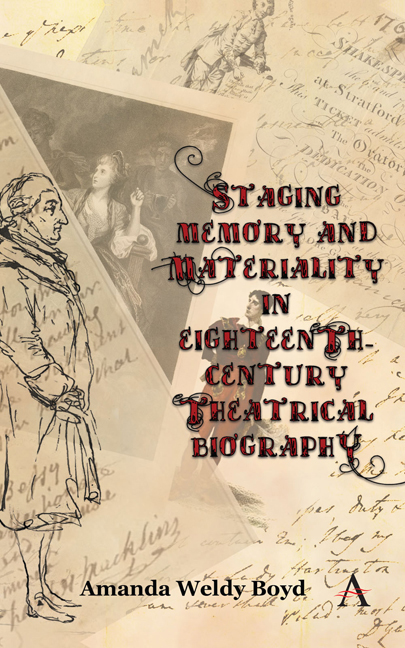Book contents
- Frontmatter
- Contents
- Acknowledgments
- Introduction: Competition and Legitimacy
- 1 “Davies's Name […] in Fame's Brightest Page Shall on Garrick Attend”: From Anonymous to Personalized Participation in the Memoirs of the Life of David Garrick
- 2 His Work, My Words: Anxiety and Competition in the Posthumous Lives of Charles Macklin, Comedian
- 3 Epistolary Resurrections: James Boaden and the Rise of the Professional Thespian Biographer
- Epilogue: The Limits of Materially Bound Permanence
- Notes
- References
- Index
3 - Epistolary Resurrections: James Boaden and the Rise of the Professional Thespian Biographer
Published online by Cambridge University Press: 10 May 2018
- Frontmatter
- Contents
- Acknowledgments
- Introduction: Competition and Legitimacy
- 1 “Davies's Name […] in Fame's Brightest Page Shall on Garrick Attend”: From Anonymous to Personalized Participation in the Memoirs of the Life of David Garrick
- 2 His Work, My Words: Anxiety and Competition in the Posthumous Lives of Charles Macklin, Comedian
- 3 Epistolary Resurrections: James Boaden and the Rise of the Professional Thespian Biographer
- Epilogue: The Limits of Materially Bound Permanence
- Notes
- References
- Index
Summary
James Boaden as “Goodman Delver”
In The Life of Mrs. Jordan (1831), James Boaden describes himself as “the modern patron” of ghosts. A playwright as well as a biographer, he is discussing his plan to stage a deceased character in M. G. Lewis's play The The Castle Spectre, which Boaden calls The Spirit in the Castle. “I had no intention to give up the ghost,” he quips, describing how he was able to rig an apparatus that allowed the “maternal shade” to levitate rather than shuffle across the stage. “But enough of such spectacles,” he says abruptly, by which he means stage machinery rather than supernatural intervention.
Today, James Boaden maintains a niche following among theatrical historians based on his delightful descriptions of staging ghosts in several of his own plays, and his recurring analysis of how Hamlet should have responded to his father's ghost in the pivotal drawbridge scene. In his auspices as a biographer, Boaden himself was the stage machinery that figuratively resurrected the dead, seeking, just as he had with the ghosts in his plays, to animate lost players, albeit by different techniques. His first biography was motivated, he says, by his immediate and immense sorrow at the passing of his “excellent friend” John Philip Kemble, renowned Shakespearean actor. Appropriately, Boaden originally announces this plan in his An Inquiry into the Authenticity of Various Pictures and Prints […] Offered to the Public as Portraits of Shakespeare (1824). The Life of John Philip Kemble accordingly appeared in 1825, one year after Kemble's death. Next came the Memoirs of Mrs. Siddons (1827), followed by the Life of Mrs. Jordan (1831), the Private Correspondence of David Garrick (1831– 32), and finally the Memoirs of Mrs. Inchbald (1833).
Boaden is unique among early thespian biographers for the unprecedented fecundity of his biographical muse: he is, in a sense, the first professional theatrical biographer, based on output. His temporally brief but topically broad career offers a rare glimpse into the trajectory of an artist seeking to reevaluate not only his own work, but also the underpinnings of the genre in which he continually participates.
- Type
- Chapter
- Information
- Publisher: Anthem PressPrint publication year: 2017



